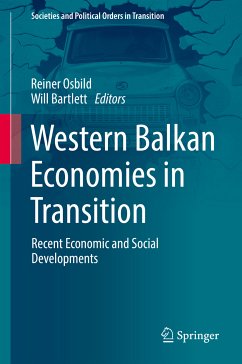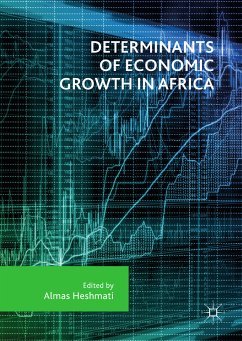
Sustainable Growth and Development of Economic Systems (eBook, PDF)
Contradictions in the Era of Digitalization and Globalization
Redaktion: Ashmarina, Svetlana; Vochozka, Marek
Versandkostenfrei!
Sofort per Download lieferbar
128,95 €
inkl. MwSt.
Weitere Ausgaben:

PAYBACK Punkte
64 °P sammeln!
This contributed volume presents the outcomes of multidisciplinary studies on the problem of sustainable economic development. The key issues addressed here are economic transformation, crisis management, formation and implementation of industrial policy in the innovative economy, and the development of individual industries (oil refining, transport, education, tourism, the financial sector, etc.), as well as the problem of resistance to changes in the economy. Special attention is paid to economic growth under unstable conditions and the impact of digitalization on the development of economic...
This contributed volume presents the outcomes of multidisciplinary studies on the problem of sustainable economic development. The key issues addressed here are economic transformation, crisis management, formation and implementation of industrial policy in the innovative economy, and the development of individual industries (oil refining, transport, education, tourism, the financial sector, etc.), as well as the problem of resistance to changes in the economy. Special attention is paid to economic growth under unstable conditions and the impact of digitalization on the development of economic processes.
This book is dividided into five parts, the first of which deals with factors and conditions determining the sustainable development of different socio-economic systems, as well as issues in connection with the post-crisis development of regional economies. In turn, the second part is devoted to an analysis of the innovative development of the economy, risk assessment for innovation projects, readiness for changes and innovations, and various instruments of innovative economic development. Prospects for the digitalization of the economy and the current changes in economic systems caused by digitalization are considered in the third part of the book. In the fourth part, the authors discuss the specific features of labor market development, and professional competencies that will be essential to the sustainable development of the economy. In closing, the fifth part presents sectoral and intra-organizational aspects of sustainable economic development.
This book is dividided into five parts, the first of which deals with factors and conditions determining the sustainable development of different socio-economic systems, as well as issues in connection with the post-crisis development of regional economies. In turn, the second part is devoted to an analysis of the innovative development of the economy, risk assessment for innovation projects, readiness for changes and innovations, and various instruments of innovative economic development. Prospects for the digitalization of the economy and the current changes in economic systems caused by digitalization are considered in the third part of the book. In the fourth part, the authors discuss the specific features of labor market development, and professional competencies that will be essential to the sustainable development of the economy. In closing, the fifth part presents sectoral and intra-organizational aspects of sustainable economic development.
Dieser Download kann aus rechtlichen Gründen nur mit Rechnungsadresse in A, B, BG, CY, CZ, D, DK, EW, E, FIN, F, GR, HR, H, IRL, I, LT, L, LR, M, NL, PL, P, R, S, SLO, SK ausgeliefert werden.












